Business Toolkit Report: Revenue Management in Travel and Tourism
VerifiedAdded on 2020/10/23
|17
|4290
|408
Report
AI Summary
This report delves into the travel and tourism industry, focusing on revenue management, HR practices, and legal and financial considerations. It analyzes revenue management principles, including predicting customer behavior and optimizing product offerings. The report then explores the HR life cycle, highlighting stages such as recruiting, career development, and performance evaluation, and their importance for talent retention and development. A performance management plan for a financial manager is also presented. Furthermore, the report examines relevant legislation and its impact on business decisions, including company, employment, and contract law. It also discusses financial statements, reporting mechanisms, and the value of budgets for controlling business performance, using Thomas Cook as a case study.
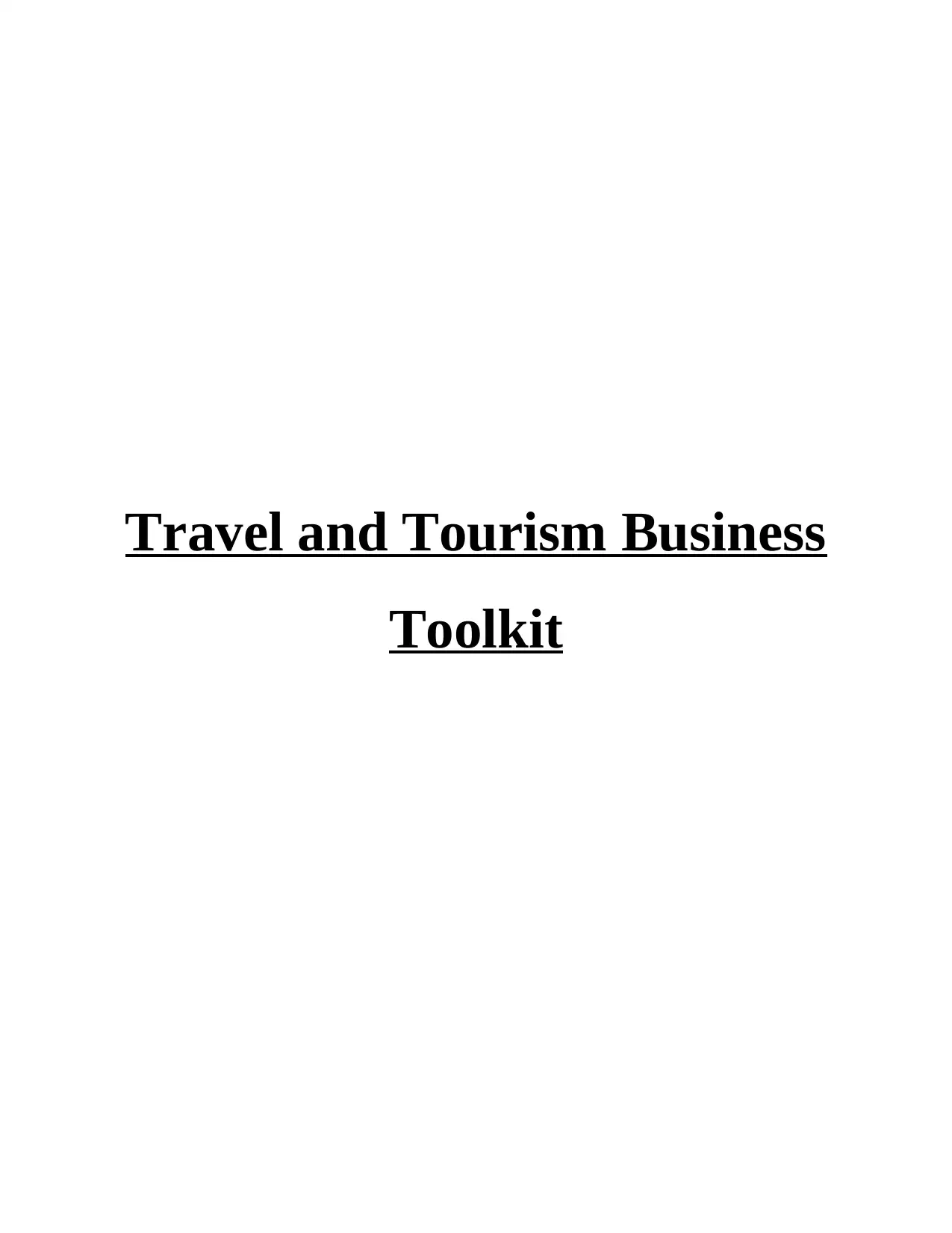
Travel and Tourism Business
Toolkit
Toolkit
Paraphrase This Document
Need a fresh take? Get an instant paraphrase of this document with our AI Paraphraser
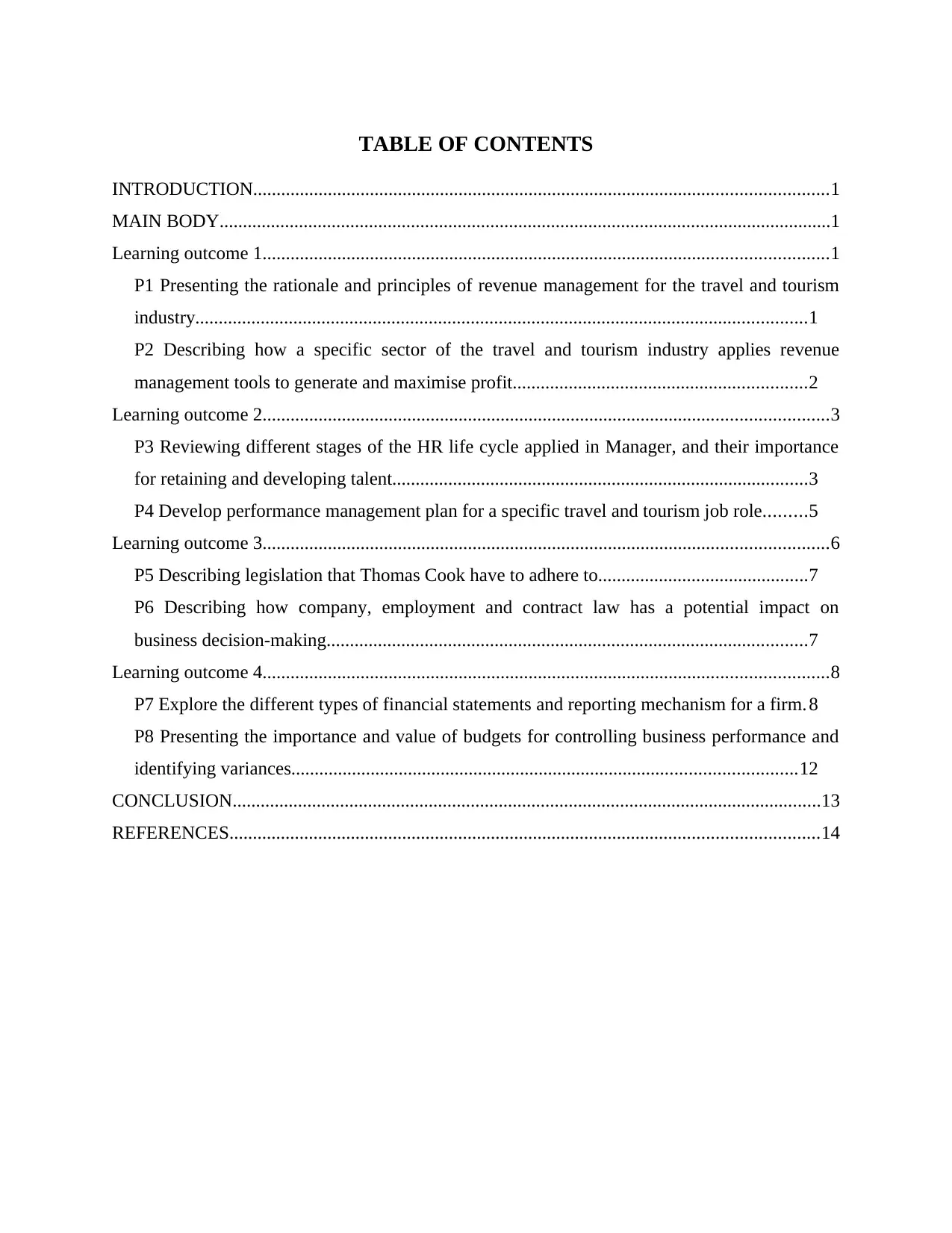
TABLE OF CONTENTS
INTRODUCTION...........................................................................................................................1
MAIN BODY...................................................................................................................................1
Learning outcome 1.........................................................................................................................1
P1 Presenting the rationale and principles of revenue management for the travel and tourism
industry...................................................................................................................................1
P2 Describing how a specific sector of the travel and tourism industry applies revenue
management tools to generate and maximise profit...............................................................2
Learning outcome 2.........................................................................................................................3
P3 Reviewing different stages of the HR life cycle applied in Manager, and their importance
for retaining and developing talent.........................................................................................3
P4 Develop performance management plan for a specific travel and tourism job role.........5
Learning outcome 3.........................................................................................................................6
P5 Describing legislation that Thomas Cook have to adhere to.............................................7
P6 Describing how company, employment and contract law has a potential impact on
business decision-making.......................................................................................................7
Learning outcome 4.........................................................................................................................8
P7 Explore the different types of financial statements and reporting mechanism for a firm. 8
P8 Presenting the importance and value of budgets for controlling business performance and
identifying variances............................................................................................................12
CONCLUSION..............................................................................................................................13
REFERENCES..............................................................................................................................14
INTRODUCTION...........................................................................................................................1
MAIN BODY...................................................................................................................................1
Learning outcome 1.........................................................................................................................1
P1 Presenting the rationale and principles of revenue management for the travel and tourism
industry...................................................................................................................................1
P2 Describing how a specific sector of the travel and tourism industry applies revenue
management tools to generate and maximise profit...............................................................2
Learning outcome 2.........................................................................................................................3
P3 Reviewing different stages of the HR life cycle applied in Manager, and their importance
for retaining and developing talent.........................................................................................3
P4 Develop performance management plan for a specific travel and tourism job role.........5
Learning outcome 3.........................................................................................................................6
P5 Describing legislation that Thomas Cook have to adhere to.............................................7
P6 Describing how company, employment and contract law has a potential impact on
business decision-making.......................................................................................................7
Learning outcome 4.........................................................................................................................8
P7 Explore the different types of financial statements and reporting mechanism for a firm. 8
P8 Presenting the importance and value of budgets for controlling business performance and
identifying variances............................................................................................................12
CONCLUSION..............................................................................................................................13
REFERENCES..............................................................................................................................14
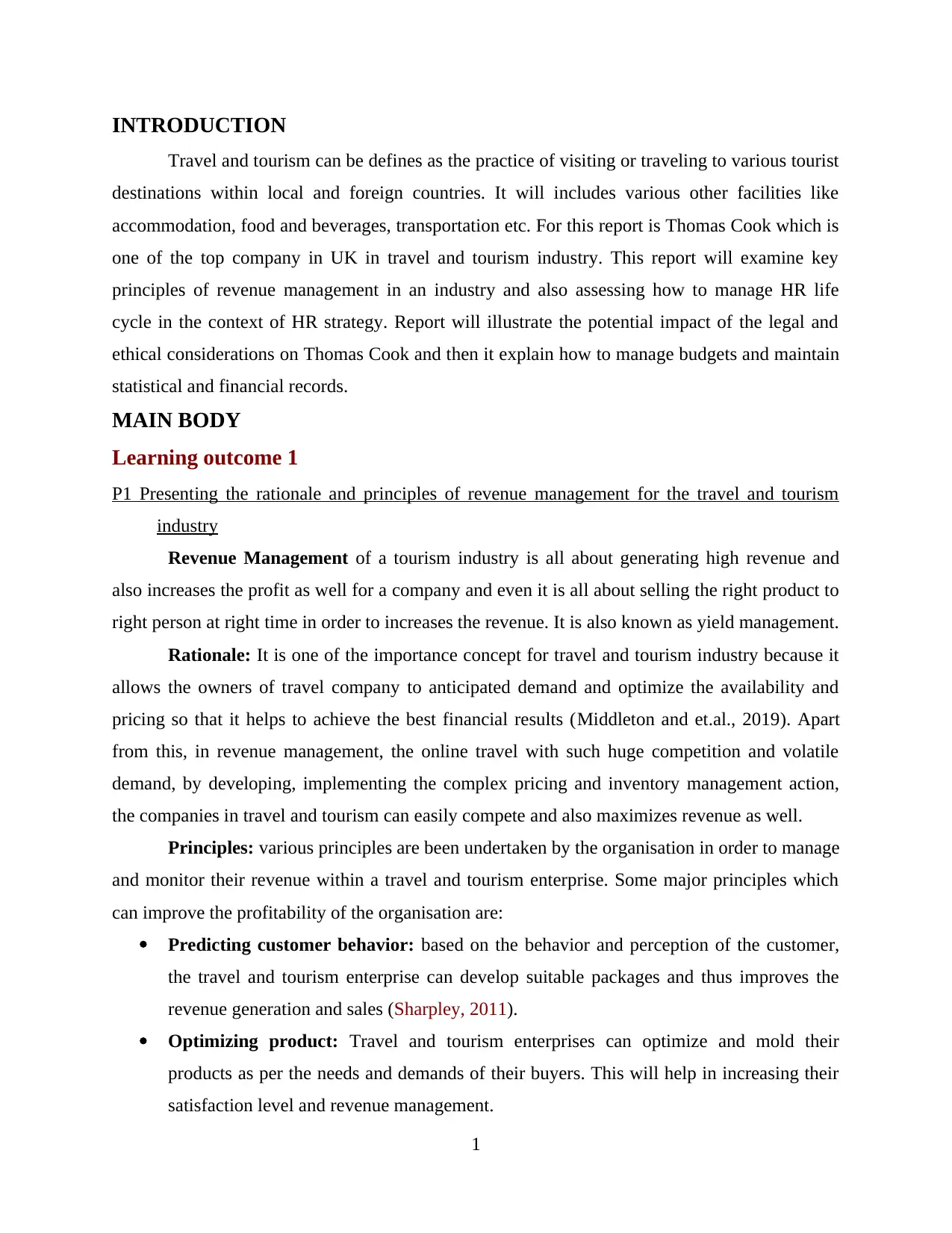
INTRODUCTION
Travel and tourism can be defines as the practice of visiting or traveling to various tourist
destinations within local and foreign countries. It will includes various other facilities like
accommodation, food and beverages, transportation etc. For this report is Thomas Cook which is
one of the top company in UK in travel and tourism industry. This report will examine key
principles of revenue management in an industry and also assessing how to manage HR life
cycle in the context of HR strategy. Report will illustrate the potential impact of the legal and
ethical considerations on Thomas Cook and then it explain how to manage budgets and maintain
statistical and financial records.
MAIN BODY
Learning outcome 1
P1 Presenting the rationale and principles of revenue management for the travel and tourism
industry
Revenue Management of a tourism industry is all about generating high revenue and
also increases the profit as well for a company and even it is all about selling the right product to
right person at right time in order to increases the revenue. It is also known as yield management.
Rationale: It is one of the importance concept for travel and tourism industry because it
allows the owners of travel company to anticipated demand and optimize the availability and
pricing so that it helps to achieve the best financial results (Middleton and et.al., 2019). Apart
from this, in revenue management, the online travel with such huge competition and volatile
demand, by developing, implementing the complex pricing and inventory management action,
the companies in travel and tourism can easily compete and also maximizes revenue as well.
Principles: various principles are been undertaken by the organisation in order to manage
and monitor their revenue within a travel and tourism enterprise. Some major principles which
can improve the profitability of the organisation are:
Predicting customer behavior: based on the behavior and perception of the customer,
the travel and tourism enterprise can develop suitable packages and thus improves the
revenue generation and sales (Sharpley, 2011).
Optimizing product: Travel and tourism enterprises can optimize and mold their
products as per the needs and demands of their buyers. This will help in increasing their
satisfaction level and revenue management.
1
Travel and tourism can be defines as the practice of visiting or traveling to various tourist
destinations within local and foreign countries. It will includes various other facilities like
accommodation, food and beverages, transportation etc. For this report is Thomas Cook which is
one of the top company in UK in travel and tourism industry. This report will examine key
principles of revenue management in an industry and also assessing how to manage HR life
cycle in the context of HR strategy. Report will illustrate the potential impact of the legal and
ethical considerations on Thomas Cook and then it explain how to manage budgets and maintain
statistical and financial records.
MAIN BODY
Learning outcome 1
P1 Presenting the rationale and principles of revenue management for the travel and tourism
industry
Revenue Management of a tourism industry is all about generating high revenue and
also increases the profit as well for a company and even it is all about selling the right product to
right person at right time in order to increases the revenue. It is also known as yield management.
Rationale: It is one of the importance concept for travel and tourism industry because it
allows the owners of travel company to anticipated demand and optimize the availability and
pricing so that it helps to achieve the best financial results (Middleton and et.al., 2019). Apart
from this, in revenue management, the online travel with such huge competition and volatile
demand, by developing, implementing the complex pricing and inventory management action,
the companies in travel and tourism can easily compete and also maximizes revenue as well.
Principles: various principles are been undertaken by the organisation in order to manage
and monitor their revenue within a travel and tourism enterprise. Some major principles which
can improve the profitability of the organisation are:
Predicting customer behavior: based on the behavior and perception of the customer,
the travel and tourism enterprise can develop suitable packages and thus improves the
revenue generation and sales (Sharpley, 2011).
Optimizing product: Travel and tourism enterprises can optimize and mold their
products as per the needs and demands of their buyers. This will help in increasing their
satisfaction level and revenue management.
1
⊘ This is a preview!⊘
Do you want full access?
Subscribe today to unlock all pages.

Trusted by 1+ million students worldwide
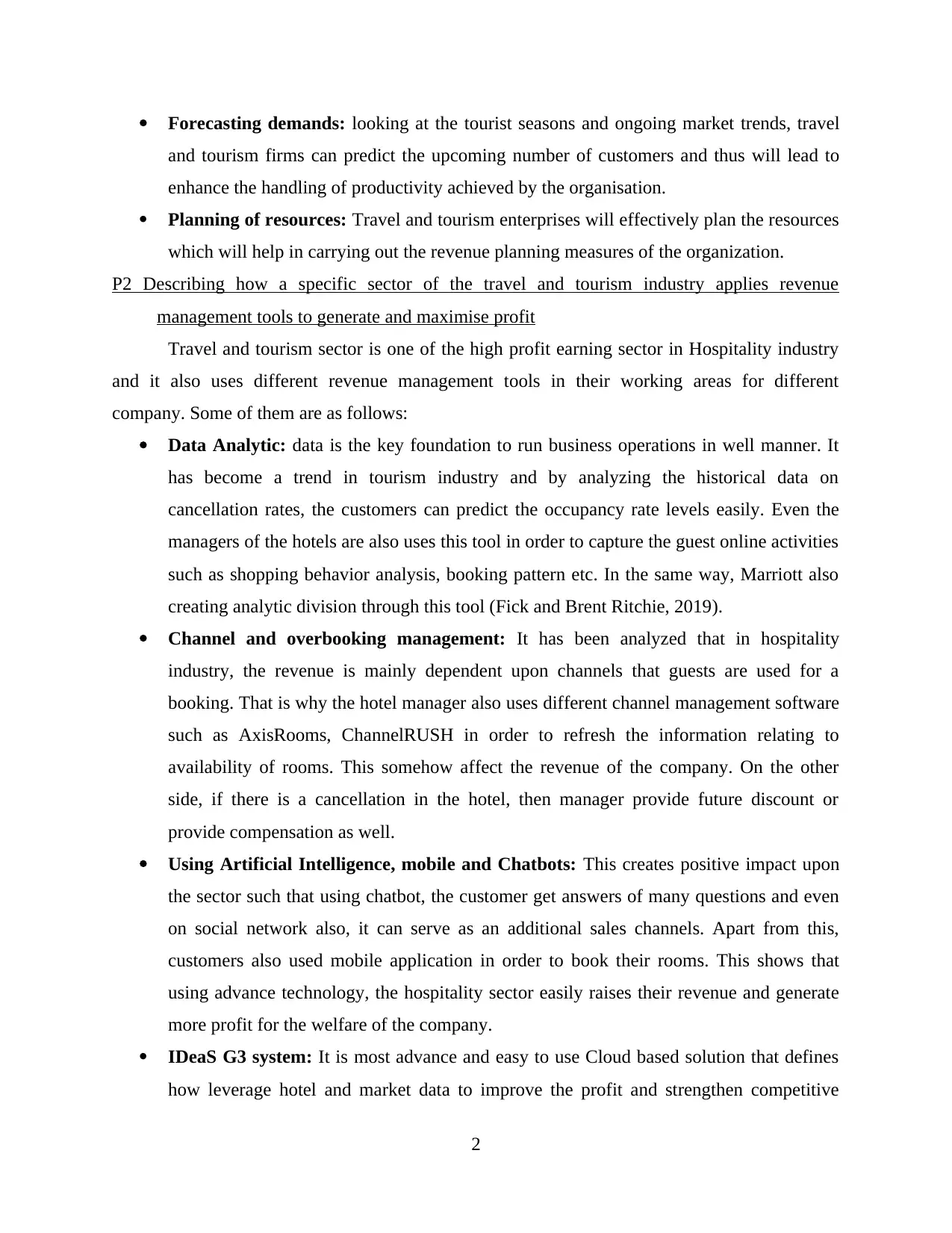
Forecasting demands: looking at the tourist seasons and ongoing market trends, travel
and tourism firms can predict the upcoming number of customers and thus will lead to
enhance the handling of productivity achieved by the organisation.
Planning of resources: Travel and tourism enterprises will effectively plan the resources
which will help in carrying out the revenue planning measures of the organization.
P2 Describing how a specific sector of the travel and tourism industry applies revenue
management tools to generate and maximise profit
Travel and tourism sector is one of the high profit earning sector in Hospitality industry
and it also uses different revenue management tools in their working areas for different
company. Some of them are as follows:
Data Analytic: data is the key foundation to run business operations in well manner. It
has become a trend in tourism industry and by analyzing the historical data on
cancellation rates, the customers can predict the occupancy rate levels easily. Even the
managers of the hotels are also uses this tool in order to capture the guest online activities
such as shopping behavior analysis, booking pattern etc. In the same way, Marriott also
creating analytic division through this tool (Fick and Brent Ritchie, 2019).
Channel and overbooking management: It has been analyzed that in hospitality
industry, the revenue is mainly dependent upon channels that guests are used for a
booking. That is why the hotel manager also uses different channel management software
such as AxisRooms, ChannelRUSH in order to refresh the information relating to
availability of rooms. This somehow affect the revenue of the company. On the other
side, if there is a cancellation in the hotel, then manager provide future discount or
provide compensation as well.
Using Artificial Intelligence, mobile and Chatbots: This creates positive impact upon
the sector such that using chatbot, the customer get answers of many questions and even
on social network also, it can serve as an additional sales channels. Apart from this,
customers also used mobile application in order to book their rooms. This shows that
using advance technology, the hospitality sector easily raises their revenue and generate
more profit for the welfare of the company.
IDeaS G3 system: It is most advance and easy to use Cloud based solution that defines
how leverage hotel and market data to improve the profit and strengthen competitive
2
and tourism firms can predict the upcoming number of customers and thus will lead to
enhance the handling of productivity achieved by the organisation.
Planning of resources: Travel and tourism enterprises will effectively plan the resources
which will help in carrying out the revenue planning measures of the organization.
P2 Describing how a specific sector of the travel and tourism industry applies revenue
management tools to generate and maximise profit
Travel and tourism sector is one of the high profit earning sector in Hospitality industry
and it also uses different revenue management tools in their working areas for different
company. Some of them are as follows:
Data Analytic: data is the key foundation to run business operations in well manner. It
has become a trend in tourism industry and by analyzing the historical data on
cancellation rates, the customers can predict the occupancy rate levels easily. Even the
managers of the hotels are also uses this tool in order to capture the guest online activities
such as shopping behavior analysis, booking pattern etc. In the same way, Marriott also
creating analytic division through this tool (Fick and Brent Ritchie, 2019).
Channel and overbooking management: It has been analyzed that in hospitality
industry, the revenue is mainly dependent upon channels that guests are used for a
booking. That is why the hotel manager also uses different channel management software
such as AxisRooms, ChannelRUSH in order to refresh the information relating to
availability of rooms. This somehow affect the revenue of the company. On the other
side, if there is a cancellation in the hotel, then manager provide future discount or
provide compensation as well.
Using Artificial Intelligence, mobile and Chatbots: This creates positive impact upon
the sector such that using chatbot, the customer get answers of many questions and even
on social network also, it can serve as an additional sales channels. Apart from this,
customers also used mobile application in order to book their rooms. This shows that
using advance technology, the hospitality sector easily raises their revenue and generate
more profit for the welfare of the company.
IDeaS G3 system: It is most advance and easy to use Cloud based solution that defines
how leverage hotel and market data to improve the profit and strengthen competitive
2
Paraphrase This Document
Need a fresh take? Get an instant paraphrase of this document with our AI Paraphraser
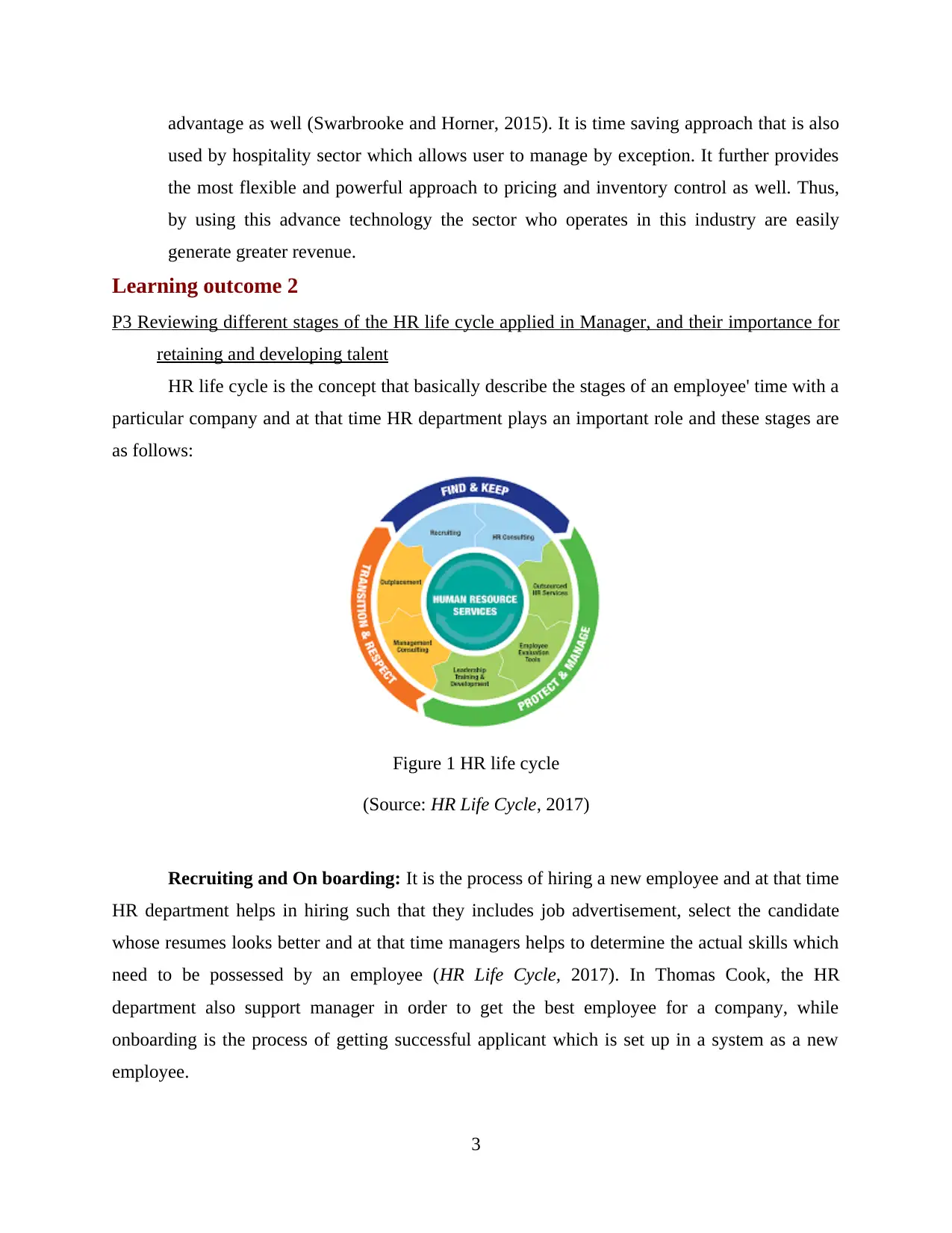
advantage as well (Swarbrooke and Horner, 2015). It is time saving approach that is also
used by hospitality sector which allows user to manage by exception. It further provides
the most flexible and powerful approach to pricing and inventory control as well. Thus,
by using this advance technology the sector who operates in this industry are easily
generate greater revenue.
Learning outcome 2
P3 Reviewing different stages of the HR life cycle applied in Manager, and their importance for
retaining and developing talent
HR life cycle is the concept that basically describe the stages of an employee' time with a
particular company and at that time HR department plays an important role and these stages are
as follows:
Figure 1 HR life cycle
(Source: HR Life Cycle, 2017)
Recruiting and On boarding: It is the process of hiring a new employee and at that time
HR department helps in hiring such that they includes job advertisement, select the candidate
whose resumes looks better and at that time managers helps to determine the actual skills which
need to be possessed by an employee (HR Life Cycle, 2017). In Thomas Cook, the HR
department also support manager in order to get the best employee for a company, while
onboarding is the process of getting successful applicant which is set up in a system as a new
employee.
3
used by hospitality sector which allows user to manage by exception. It further provides
the most flexible and powerful approach to pricing and inventory control as well. Thus,
by using this advance technology the sector who operates in this industry are easily
generate greater revenue.
Learning outcome 2
P3 Reviewing different stages of the HR life cycle applied in Manager, and their importance for
retaining and developing talent
HR life cycle is the concept that basically describe the stages of an employee' time with a
particular company and at that time HR department plays an important role and these stages are
as follows:
Figure 1 HR life cycle
(Source: HR Life Cycle, 2017)
Recruiting and On boarding: It is the process of hiring a new employee and at that time
HR department helps in hiring such that they includes job advertisement, select the candidate
whose resumes looks better and at that time managers helps to determine the actual skills which
need to be possessed by an employee (HR Life Cycle, 2017). In Thomas Cook, the HR
department also support manager in order to get the best employee for a company, while
onboarding is the process of getting successful applicant which is set up in a system as a new
employee.
3
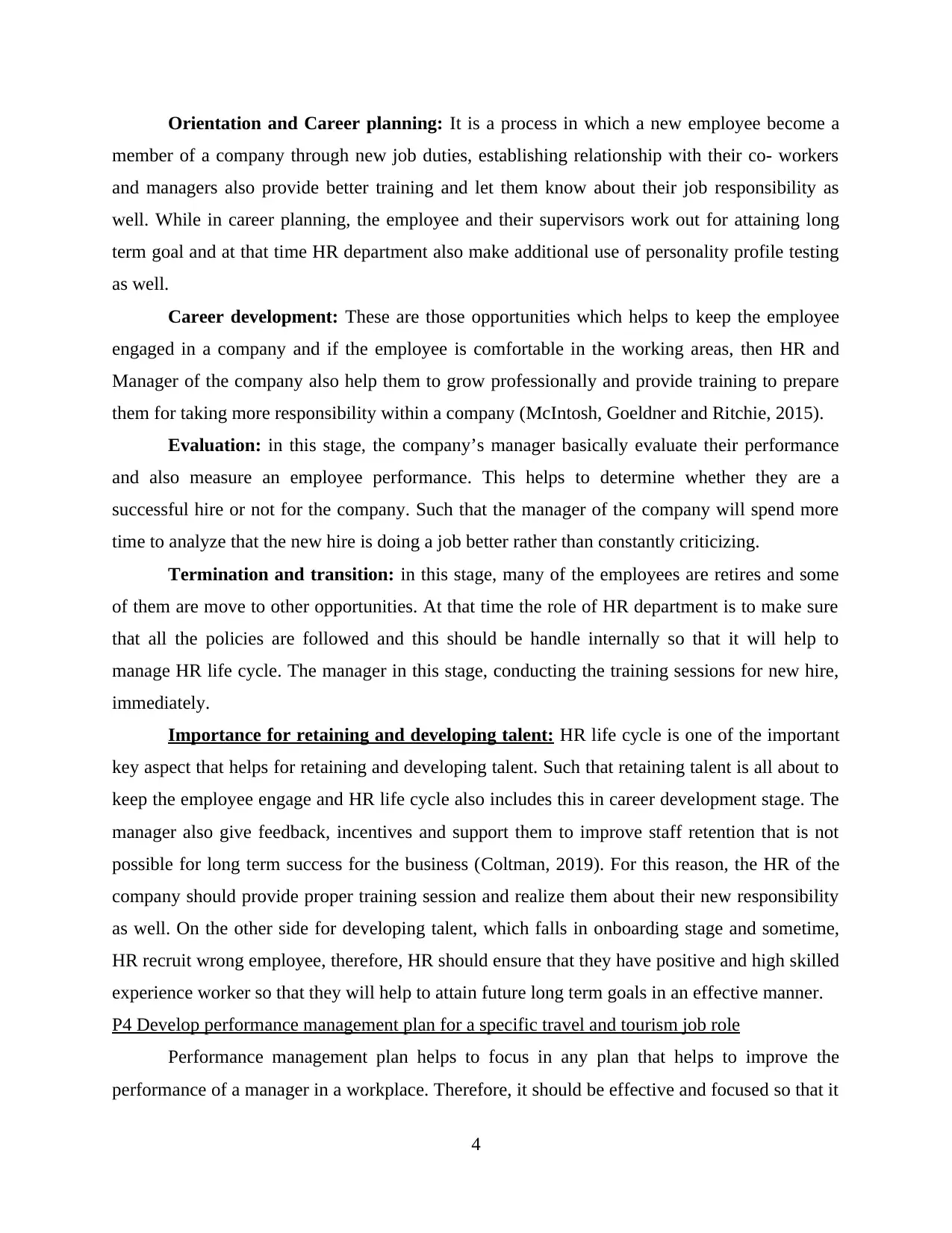
Orientation and Career planning: It is a process in which a new employee become a
member of a company through new job duties, establishing relationship with their co- workers
and managers also provide better training and let them know about their job responsibility as
well. While in career planning, the employee and their supervisors work out for attaining long
term goal and at that time HR department also make additional use of personality profile testing
as well.
Career development: These are those opportunities which helps to keep the employee
engaged in a company and if the employee is comfortable in the working areas, then HR and
Manager of the company also help them to grow professionally and provide training to prepare
them for taking more responsibility within a company (McIntosh, Goeldner and Ritchie, 2015).
Evaluation: in this stage, the company’s manager basically evaluate their performance
and also measure an employee performance. This helps to determine whether they are a
successful hire or not for the company. Such that the manager of the company will spend more
time to analyze that the new hire is doing a job better rather than constantly criticizing.
Termination and transition: in this stage, many of the employees are retires and some
of them are move to other opportunities. At that time the role of HR department is to make sure
that all the policies are followed and this should be handle internally so that it will help to
manage HR life cycle. The manager in this stage, conducting the training sessions for new hire,
immediately.
Importance for retaining and developing talent: HR life cycle is one of the important
key aspect that helps for retaining and developing talent. Such that retaining talent is all about to
keep the employee engage and HR life cycle also includes this in career development stage. The
manager also give feedback, incentives and support them to improve staff retention that is not
possible for long term success for the business (Coltman, 2019). For this reason, the HR of the
company should provide proper training session and realize them about their new responsibility
as well. On the other side for developing talent, which falls in onboarding stage and sometime,
HR recruit wrong employee, therefore, HR should ensure that they have positive and high skilled
experience worker so that they will help to attain future long term goals in an effective manner.
P4 Develop performance management plan for a specific travel and tourism job role
Performance management plan helps to focus in any plan that helps to improve the
performance of a manager in a workplace. Therefore, it should be effective and focused so that it
4
member of a company through new job duties, establishing relationship with their co- workers
and managers also provide better training and let them know about their job responsibility as
well. While in career planning, the employee and their supervisors work out for attaining long
term goal and at that time HR department also make additional use of personality profile testing
as well.
Career development: These are those opportunities which helps to keep the employee
engaged in a company and if the employee is comfortable in the working areas, then HR and
Manager of the company also help them to grow professionally and provide training to prepare
them for taking more responsibility within a company (McIntosh, Goeldner and Ritchie, 2015).
Evaluation: in this stage, the company’s manager basically evaluate their performance
and also measure an employee performance. This helps to determine whether they are a
successful hire or not for the company. Such that the manager of the company will spend more
time to analyze that the new hire is doing a job better rather than constantly criticizing.
Termination and transition: in this stage, many of the employees are retires and some
of them are move to other opportunities. At that time the role of HR department is to make sure
that all the policies are followed and this should be handle internally so that it will help to
manage HR life cycle. The manager in this stage, conducting the training sessions for new hire,
immediately.
Importance for retaining and developing talent: HR life cycle is one of the important
key aspect that helps for retaining and developing talent. Such that retaining talent is all about to
keep the employee engage and HR life cycle also includes this in career development stage. The
manager also give feedback, incentives and support them to improve staff retention that is not
possible for long term success for the business (Coltman, 2019). For this reason, the HR of the
company should provide proper training session and realize them about their new responsibility
as well. On the other side for developing talent, which falls in onboarding stage and sometime,
HR recruit wrong employee, therefore, HR should ensure that they have positive and high skilled
experience worker so that they will help to attain future long term goals in an effective manner.
P4 Develop performance management plan for a specific travel and tourism job role
Performance management plan helps to focus in any plan that helps to improve the
performance of a manager in a workplace. Therefore, it should be effective and focused so that it
4
⊘ This is a preview!⊘
Do you want full access?
Subscribe today to unlock all pages.

Trusted by 1+ million students worldwide
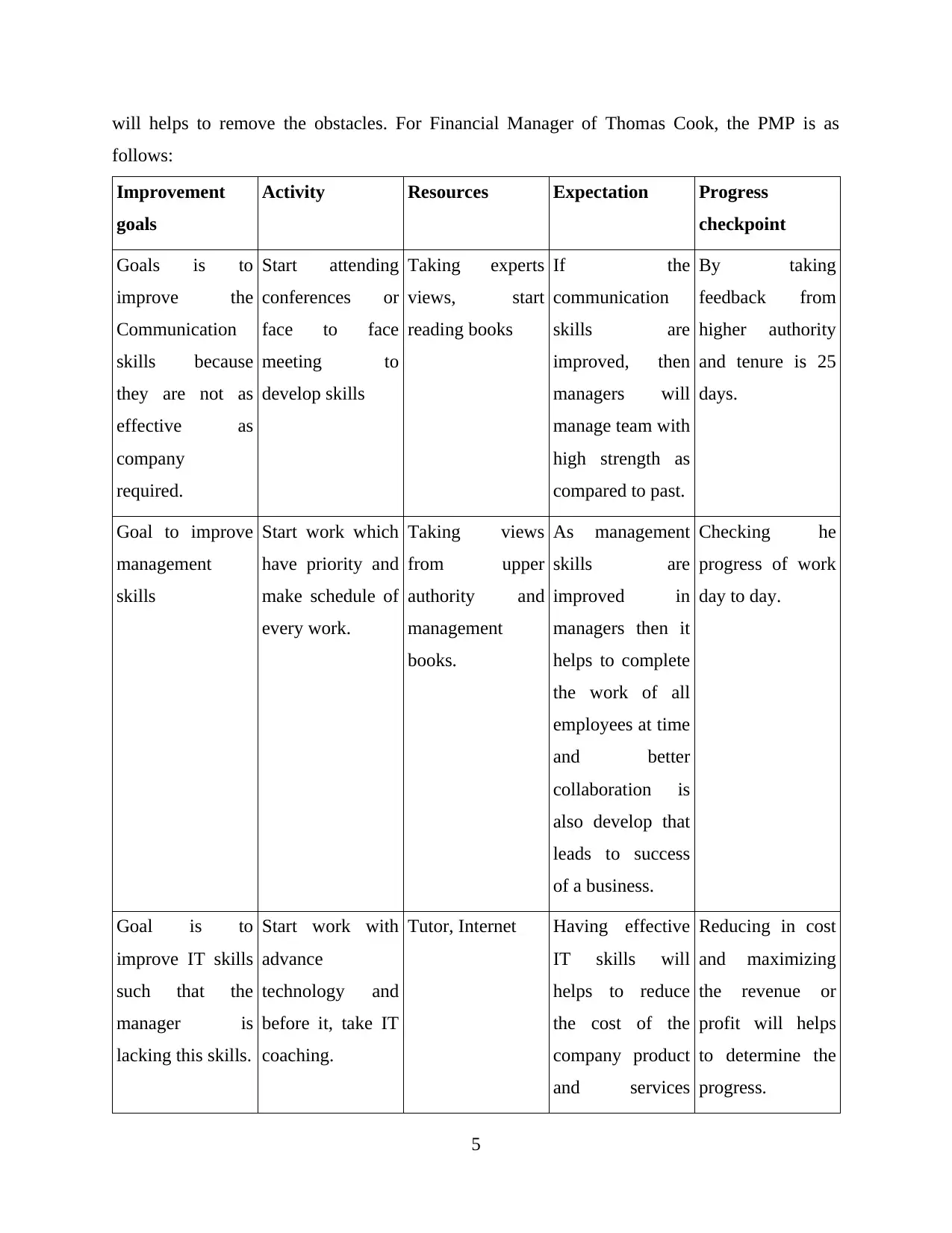
will helps to remove the obstacles. For Financial Manager of Thomas Cook, the PMP is as
follows:
Improvement
goals
Activity Resources Expectation Progress
checkpoint
Goals is to
improve the
Communication
skills because
they are not as
effective as
company
required.
Start attending
conferences or
face to face
meeting to
develop skills
Taking experts
views, start
reading books
If the
communication
skills are
improved, then
managers will
manage team with
high strength as
compared to past.
By taking
feedback from
higher authority
and tenure is 25
days.
Goal to improve
management
skills
Start work which
have priority and
make schedule of
every work.
Taking views
from upper
authority and
management
books.
As management
skills are
improved in
managers then it
helps to complete
the work of all
employees at time
and better
collaboration is
also develop that
leads to success
of a business.
Checking he
progress of work
day to day.
Goal is to
improve IT skills
such that the
manager is
lacking this skills.
Start work with
advance
technology and
before it, take IT
coaching.
Tutor, Internet Having effective
IT skills will
helps to reduce
the cost of the
company product
and services
Reducing in cost
and maximizing
the revenue or
profit will helps
to determine the
progress.
5
follows:
Improvement
goals
Activity Resources Expectation Progress
checkpoint
Goals is to
improve the
Communication
skills because
they are not as
effective as
company
required.
Start attending
conferences or
face to face
meeting to
develop skills
Taking experts
views, start
reading books
If the
communication
skills are
improved, then
managers will
manage team with
high strength as
compared to past.
By taking
feedback from
higher authority
and tenure is 25
days.
Goal to improve
management
skills
Start work which
have priority and
make schedule of
every work.
Taking views
from upper
authority and
management
books.
As management
skills are
improved in
managers then it
helps to complete
the work of all
employees at time
and better
collaboration is
also develop that
leads to success
of a business.
Checking he
progress of work
day to day.
Goal is to
improve IT skills
such that the
manager is
lacking this skills.
Start work with
advance
technology and
before it, take IT
coaching.
Tutor, Internet Having effective
IT skills will
helps to reduce
the cost of the
company product
and services
Reducing in cost
and maximizing
the revenue or
profit will helps
to determine the
progress.
5
Paraphrase This Document
Need a fresh take? Get an instant paraphrase of this document with our AI Paraphraser
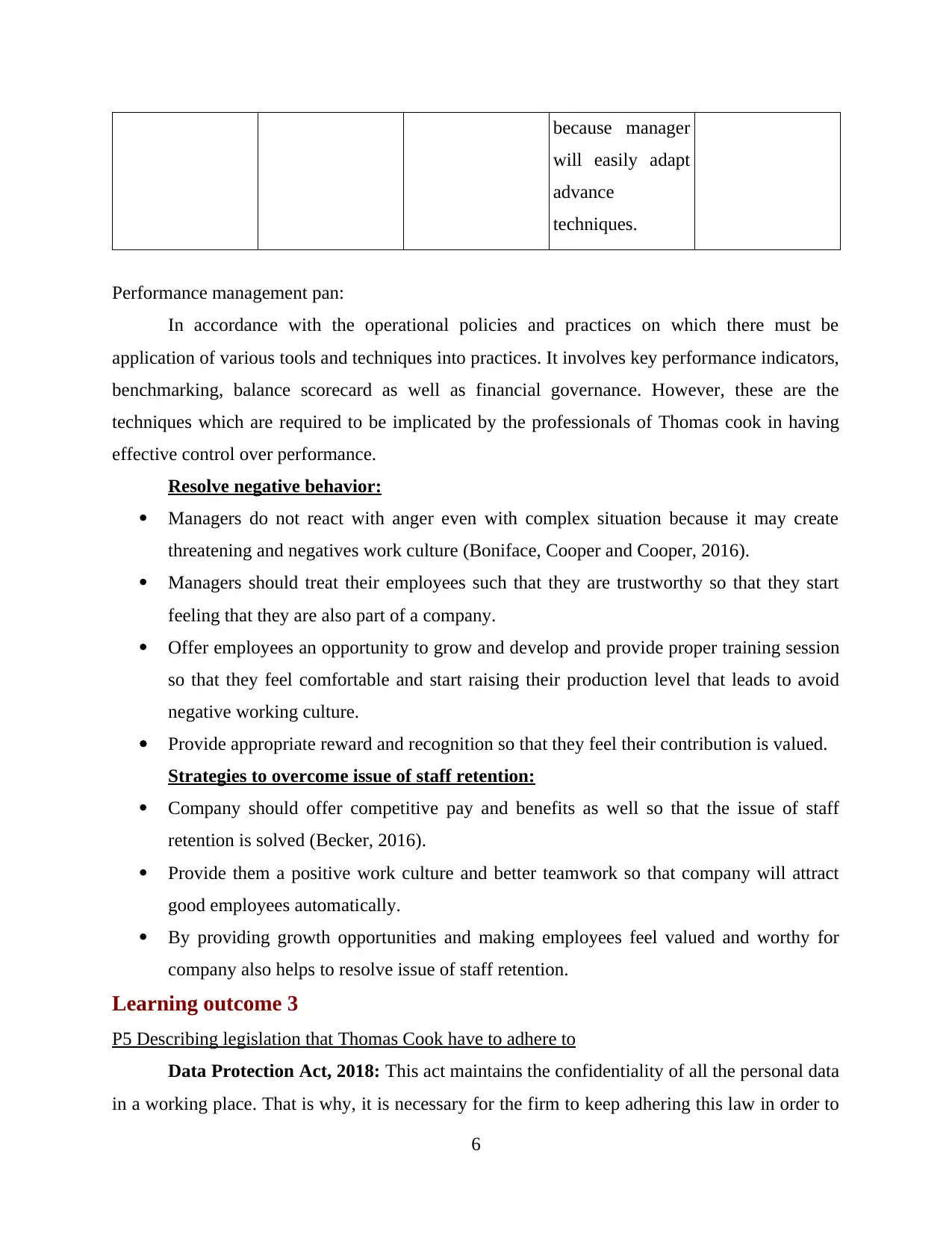
because manager
will easily adapt
advance
techniques.
Performance management pan:
In accordance with the operational policies and practices on which there must be
application of various tools and techniques into practices. It involves key performance indicators,
benchmarking, balance scorecard as well as financial governance. However, these are the
techniques which are required to be implicated by the professionals of Thomas cook in having
effective control over performance.
Resolve negative behavior:
Managers do not react with anger even with complex situation because it may create
threatening and negatives work culture (Boniface, Cooper and Cooper, 2016).
Managers should treat their employees such that they are trustworthy so that they start
feeling that they are also part of a company.
Offer employees an opportunity to grow and develop and provide proper training session
so that they feel comfortable and start raising their production level that leads to avoid
negative working culture.
Provide appropriate reward and recognition so that they feel their contribution is valued.
Strategies to overcome issue of staff retention:
Company should offer competitive pay and benefits as well so that the issue of staff
retention is solved (Becker, 2016).
Provide them a positive work culture and better teamwork so that company will attract
good employees automatically.
By providing growth opportunities and making employees feel valued and worthy for
company also helps to resolve issue of staff retention.
Learning outcome 3
P5 Describing legislation that Thomas Cook have to adhere to
Data Protection Act, 2018: This act maintains the confidentiality of all the personal data
in a working place. That is why, it is necessary for the firm to keep adhering this law in order to
6
will easily adapt
advance
techniques.
Performance management pan:
In accordance with the operational policies and practices on which there must be
application of various tools and techniques into practices. It involves key performance indicators,
benchmarking, balance scorecard as well as financial governance. However, these are the
techniques which are required to be implicated by the professionals of Thomas cook in having
effective control over performance.
Resolve negative behavior:
Managers do not react with anger even with complex situation because it may create
threatening and negatives work culture (Boniface, Cooper and Cooper, 2016).
Managers should treat their employees such that they are trustworthy so that they start
feeling that they are also part of a company.
Offer employees an opportunity to grow and develop and provide proper training session
so that they feel comfortable and start raising their production level that leads to avoid
negative working culture.
Provide appropriate reward and recognition so that they feel their contribution is valued.
Strategies to overcome issue of staff retention:
Company should offer competitive pay and benefits as well so that the issue of staff
retention is solved (Becker, 2016).
Provide them a positive work culture and better teamwork so that company will attract
good employees automatically.
By providing growth opportunities and making employees feel valued and worthy for
company also helps to resolve issue of staff retention.
Learning outcome 3
P5 Describing legislation that Thomas Cook have to adhere to
Data Protection Act, 2018: This act maintains the confidentiality of all the personal data
in a working place. That is why, it is necessary for the firm to keep adhering this law in order to
6
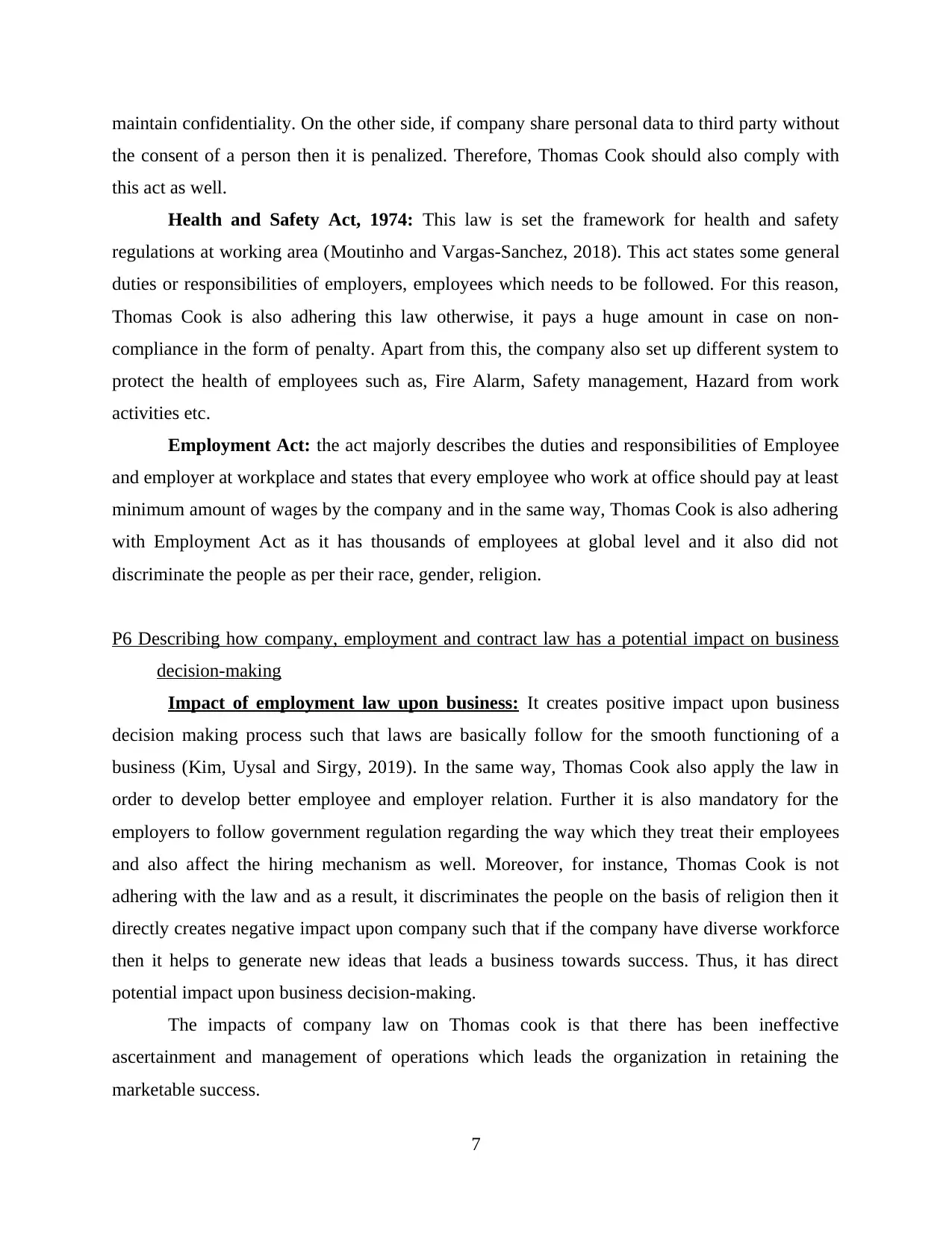
maintain confidentiality. On the other side, if company share personal data to third party without
the consent of a person then it is penalized. Therefore, Thomas Cook should also comply with
this act as well.
Health and Safety Act, 1974: This law is set the framework for health and safety
regulations at working area (Moutinho and Vargas-Sanchez, 2018). This act states some general
duties or responsibilities of employers, employees which needs to be followed. For this reason,
Thomas Cook is also adhering this law otherwise, it pays a huge amount in case on non-
compliance in the form of penalty. Apart from this, the company also set up different system to
protect the health of employees such as, Fire Alarm, Safety management, Hazard from work
activities etc.
Employment Act: the act majorly describes the duties and responsibilities of Employee
and employer at workplace and states that every employee who work at office should pay at least
minimum amount of wages by the company and in the same way, Thomas Cook is also adhering
with Employment Act as it has thousands of employees at global level and it also did not
discriminate the people as per their race, gender, religion.
P6 Describing how company, employment and contract law has a potential impact on business
decision-making
Impact of employment law upon business: It creates positive impact upon business
decision making process such that laws are basically follow for the smooth functioning of a
business (Kim, Uysal and Sirgy, 2019). In the same way, Thomas Cook also apply the law in
order to develop better employee and employer relation. Further it is also mandatory for the
employers to follow government regulation regarding the way which they treat their employees
and also affect the hiring mechanism as well. Moreover, for instance, Thomas Cook is not
adhering with the law and as a result, it discriminates the people on the basis of religion then it
directly creates negative impact upon company such that if the company have diverse workforce
then it helps to generate new ideas that leads a business towards success. Thus, it has direct
potential impact upon business decision-making.
The impacts of company law on Thomas cook is that there has been ineffective
ascertainment and management of operations which leads the organization in retaining the
marketable success.
7
the consent of a person then it is penalized. Therefore, Thomas Cook should also comply with
this act as well.
Health and Safety Act, 1974: This law is set the framework for health and safety
regulations at working area (Moutinho and Vargas-Sanchez, 2018). This act states some general
duties or responsibilities of employers, employees which needs to be followed. For this reason,
Thomas Cook is also adhering this law otherwise, it pays a huge amount in case on non-
compliance in the form of penalty. Apart from this, the company also set up different system to
protect the health of employees such as, Fire Alarm, Safety management, Hazard from work
activities etc.
Employment Act: the act majorly describes the duties and responsibilities of Employee
and employer at workplace and states that every employee who work at office should pay at least
minimum amount of wages by the company and in the same way, Thomas Cook is also adhering
with Employment Act as it has thousands of employees at global level and it also did not
discriminate the people as per their race, gender, religion.
P6 Describing how company, employment and contract law has a potential impact on business
decision-making
Impact of employment law upon business: It creates positive impact upon business
decision making process such that laws are basically follow for the smooth functioning of a
business (Kim, Uysal and Sirgy, 2019). In the same way, Thomas Cook also apply the law in
order to develop better employee and employer relation. Further it is also mandatory for the
employers to follow government regulation regarding the way which they treat their employees
and also affect the hiring mechanism as well. Moreover, for instance, Thomas Cook is not
adhering with the law and as a result, it discriminates the people on the basis of religion then it
directly creates negative impact upon company such that if the company have diverse workforce
then it helps to generate new ideas that leads a business towards success. Thus, it has direct
potential impact upon business decision-making.
The impacts of company law on Thomas cook is that there has been ineffective
ascertainment and management of operations which leads the organization in retaining the
marketable success.
7
⊘ This is a preview!⊘
Do you want full access?
Subscribe today to unlock all pages.

Trusted by 1+ million students worldwide
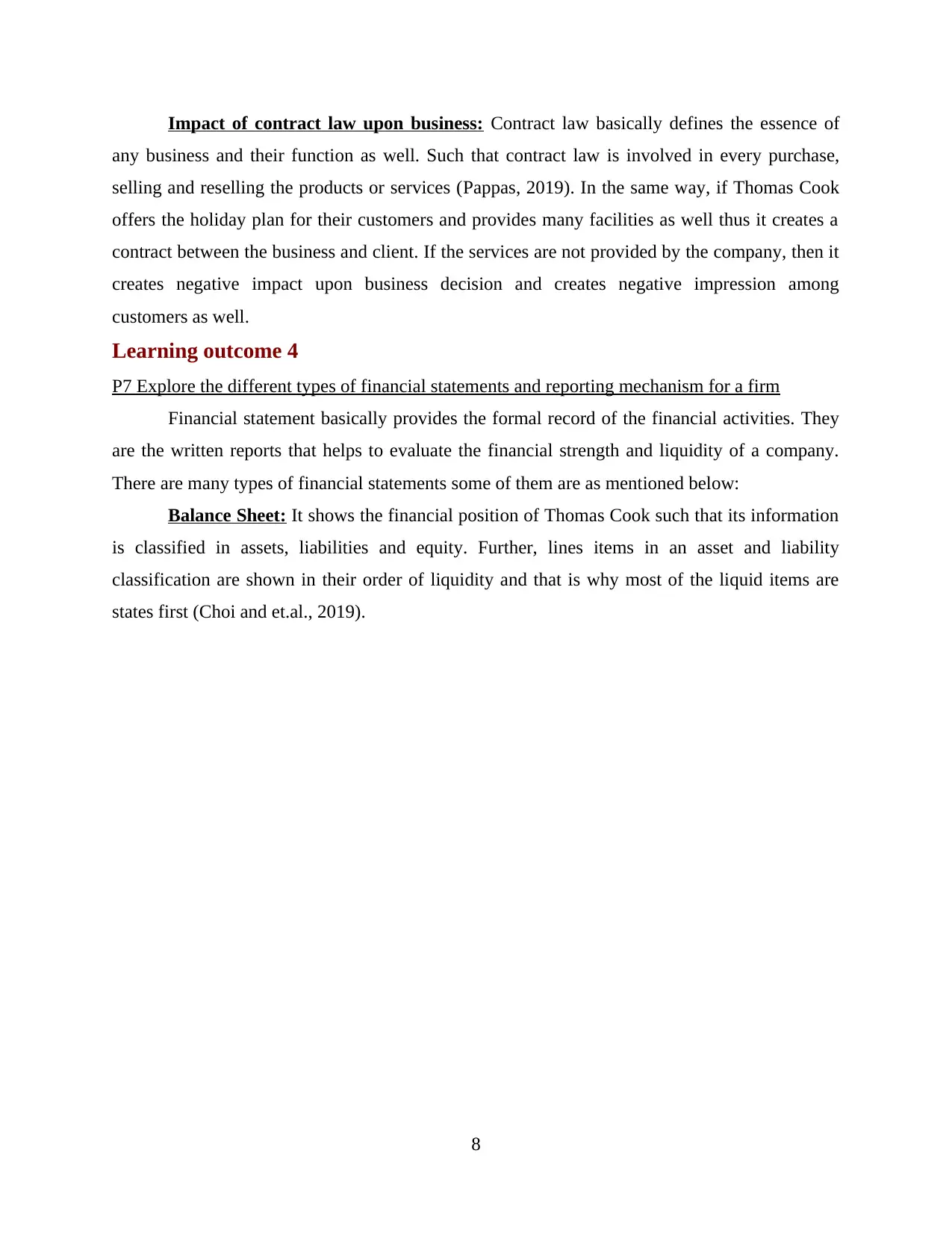
Impact of contract law upon business: Contract law basically defines the essence of
any business and their function as well. Such that contract law is involved in every purchase,
selling and reselling the products or services (Pappas, 2019). In the same way, if Thomas Cook
offers the holiday plan for their customers and provides many facilities as well thus it creates a
contract between the business and client. If the services are not provided by the company, then it
creates negative impact upon business decision and creates negative impression among
customers as well.
Learning outcome 4
P7 Explore the different types of financial statements and reporting mechanism for a firm
Financial statement basically provides the formal record of the financial activities. They
are the written reports that helps to evaluate the financial strength and liquidity of a company.
There are many types of financial statements some of them are as mentioned below:
Balance Sheet: It shows the financial position of Thomas Cook such that its information
is classified in assets, liabilities and equity. Further, lines items in an asset and liability
classification are shown in their order of liquidity and that is why most of the liquid items are
states first (Choi and et.al., 2019).
8
any business and their function as well. Such that contract law is involved in every purchase,
selling and reselling the products or services (Pappas, 2019). In the same way, if Thomas Cook
offers the holiday plan for their customers and provides many facilities as well thus it creates a
contract between the business and client. If the services are not provided by the company, then it
creates negative impact upon business decision and creates negative impression among
customers as well.
Learning outcome 4
P7 Explore the different types of financial statements and reporting mechanism for a firm
Financial statement basically provides the formal record of the financial activities. They
are the written reports that helps to evaluate the financial strength and liquidity of a company.
There are many types of financial statements some of them are as mentioned below:
Balance Sheet: It shows the financial position of Thomas Cook such that its information
is classified in assets, liabilities and equity. Further, lines items in an asset and liability
classification are shown in their order of liquidity and that is why most of the liquid items are
states first (Choi and et.al., 2019).
8
Paraphrase This Document
Need a fresh take? Get an instant paraphrase of this document with our AI Paraphraser
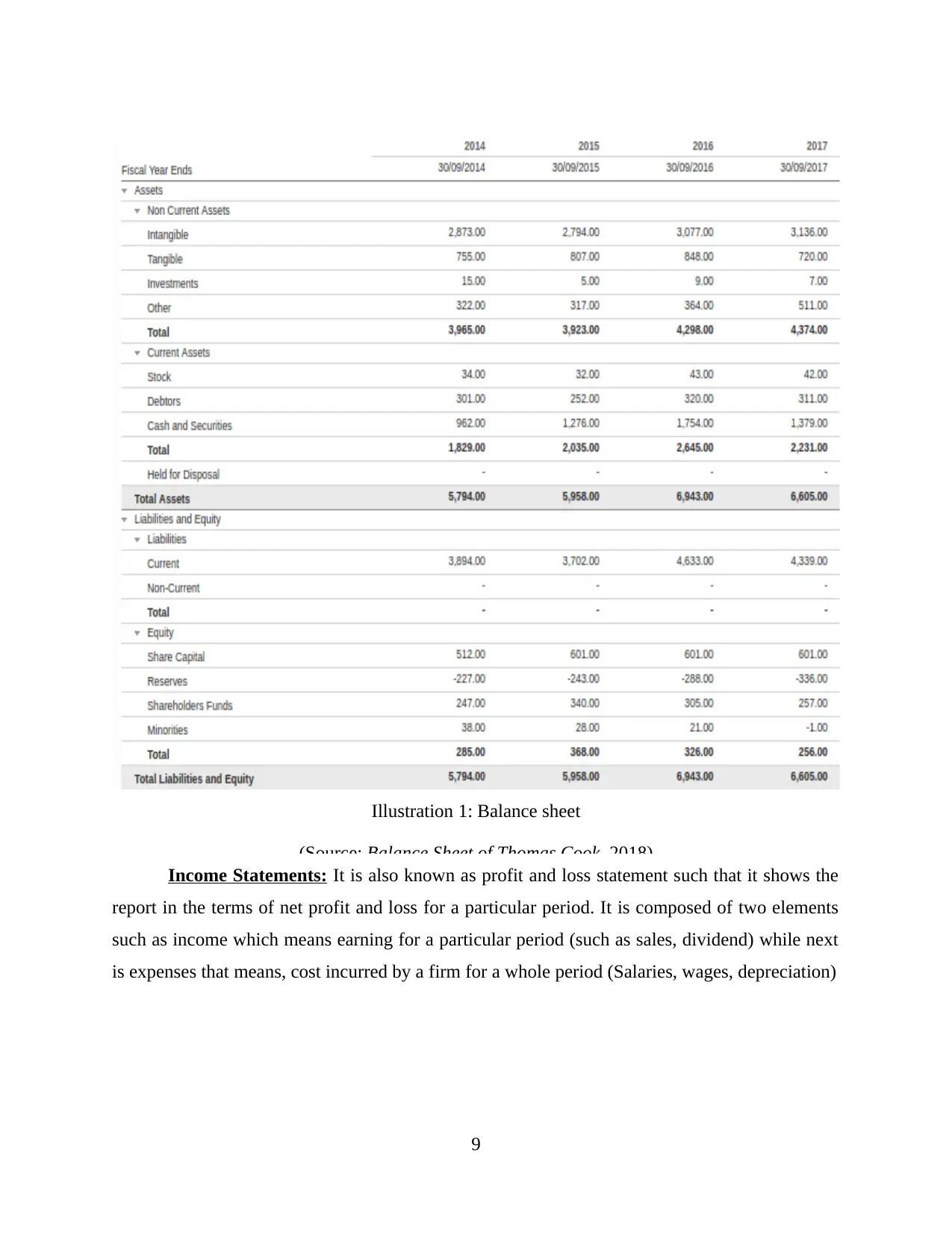
Income Statements: It is also known as profit and loss statement such that it shows the
report in the terms of net profit and loss for a particular period. It is composed of two elements
such as income which means earning for a particular period (such as sales, dividend) while next
is expenses that means, cost incurred by a firm for a whole period (Salaries, wages, depreciation)
9
Illustration 1: Balance sheet
(Source: Balance Sheet of Thomas Cook, 2018)
report in the terms of net profit and loss for a particular period. It is composed of two elements
such as income which means earning for a particular period (such as sales, dividend) while next
is expenses that means, cost incurred by a firm for a whole period (Salaries, wages, depreciation)
9
Illustration 1: Balance sheet
(Source: Balance Sheet of Thomas Cook, 2018)
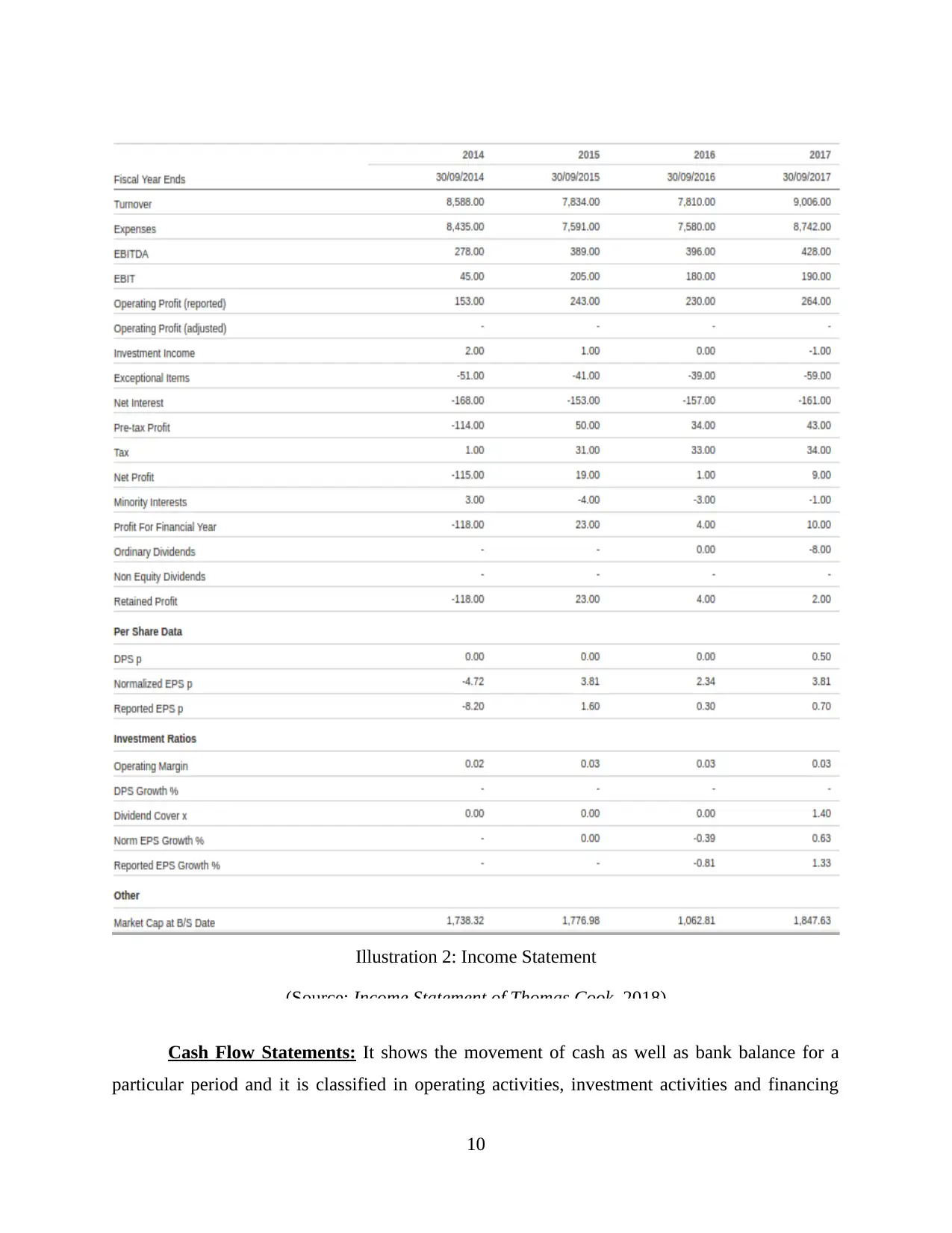
Cash Flow Statements: It shows the movement of cash as well as bank balance for a
particular period and it is classified in operating activities, investment activities and financing
10
Illustration 2: Income Statement
(Source: Income Statement of Thomas Cook, 2018)
particular period and it is classified in operating activities, investment activities and financing
10
Illustration 2: Income Statement
(Source: Income Statement of Thomas Cook, 2018)
⊘ This is a preview!⊘
Do you want full access?
Subscribe today to unlock all pages.

Trusted by 1+ million students worldwide
1 out of 17
Related Documents
Your All-in-One AI-Powered Toolkit for Academic Success.
+13062052269
info@desklib.com
Available 24*7 on WhatsApp / Email
![[object Object]](/_next/static/media/star-bottom.7253800d.svg)
Unlock your academic potential
Copyright © 2020–2026 A2Z Services. All Rights Reserved. Developed and managed by ZUCOL.





